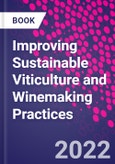*Winner of an Honorable Mention at the 2023 OIV Awards*
Improving Sustainable Practices in Viticulture and Enology provides an up-to-date view on the major issues concerning the sustainability of the wine supply chain. The book describes problems and solutions on the use of inputs (e.g., water, energy) and emphasizes the roles and limitations of implementing circularity in the sector. It identifies some of the most relevant metrics while pinpointing the most critical issues concerning the environmental impacts of wine's supply chain (vineyards, wineries, trading). This award-winning reference will help the industry producers excel while improving current environmental practices.
Professionals in industry, academics, environmentalists and anyone interested in gaining knowledge in sustainable solutions and practices in viticulture and wine production will find this resource indispensable.
Please Note: This is an On Demand product, delivery may take up to 11 working days after payment has been received.
Table of Contents
1. Achieving a more sustainable wine supply chain
environmental and socio-economic issues of the industry
2. Exploiting genetic diversity to improve environmental sustainability of Mediterranean vineyards
3. Optimizing conservation and evaluation of intra-varietal grapevine diversity
4. Phenotyping for drought tolerance in grapevine populations: the challenge of heterogeneous field conditions
5. Soil management in sustainable viticultural systems: an agroecological evaluation
6. Vineyard water balance and use
7. Modern approaches to precision and digital viticulture
8. Novel technologies and Decision Support Systems to optimize pesticide use in vineyards
9. Processed kaolin particles film, an environment friendly and climate change mitigation strategy tool for Mediterranean vineyards
10. Wine quality production and sustainability
11. Water management towards regenerative wineries
12. Energy use and management in the winery
13. Microbiological control of wine production: New tools for new challenges
14. Sustainable use of wood in wine spirit production
15. Innovative processes for the extraction of bioactive compounds from winery wastes and by-products
16. The Role of Pressure-Driven Membrane Processes on the Recovery of value-added compounds and Valorization of Lees and Wastewaters in the Wine Industry
17. Sustainable approach to quality control of grape and wine
18. Life cycle methods and experiences of environmental sustainability assessments in the wine sector
19. Wine packaging and related sustainability issues
20. Standards and indicators to assess sustainability: the relevance of metrics and inventories
21. The guardianship of Aotearoa, New Zealand's, grape and wine industry
22. Sustainable viticulture and behavioral issues: Insights from VINOVERT project
23. Interactive innovation is a key factor influencing the sustainability of value chains in the wine sector
24. European wine framework
the path towards sustainability








